
Message from the Director of the Western and Central Africa Division
Wisdom corner
“Knowledge is like love: it grows when it is shared.” – African proverb
Dear Friends and Readers,
Our region is currently facing serious development challenges – ranging from the impact of the financial crisis and commodity price volatility to climate change. These challenges call for immediate, practical and effective solutions to prevent an increase in poverty in the region. An active partnership among global, national and local leaders, together with the private sector and civil society organizations, can help ensure that fewer poor people fall behind.
IFAD’s mandate of enabling rural poor peopletoovercome poverty through community-driven development (CDD) and people’s empowerment is one of the most effective ways to achieve sustainable poverty reduction. When designed and implemented properly, CDD approaches add value to economic development efforts by creating the connections necessary to engage and benefit poor communities, thereby enhancing a project’s overall poverty reduction impact and sustainability. CDD approaches can potentially empower poor communities and strengthen the voices of marginalized groups in decision-making. They are particularly important for promoting gender equality and improving women’s access to social services.
Some difficulties exist in putting a CDD approach into practice, and a careful analysis of what has not worked will make it easier to avoid the same pitfalls in the future. At the same time, identifying elements that have worked will allow us and other development practitioners to build on what has already been achieved.
Working together, we need to make concerted efforts to analyse our experiences in CDD and provide guidance on how to consolidate and mainstream this approach into IFAD operations and more widely. We should always keep in mind a wise African proverb that says: “Knowledge is like love: it grows when it is shared.”
Mohamed Béavogui
Community-driven development to foster local development in Western and Central Africa
A knowledge fair on community-driven development, organized by the Western and Central Africa Division, was held on 15 and 16 July 2009 at IFAD headquarters in Rome. It was the latest in a number of events focusing on CDD organized by the Division, including an IFAD workshop on CDD held in Accra, Ghana, in March 2006. The fair was organized around a central question: “How can community-driven development foster local development in Western and Central Africa?”
The fair brought together project staff from Cape Verde, Ghana, Guinea, Mali, Mauritania, the Niger, Nigeria and Sao Tome and Principe; local and central government officials from various Western and Central African countries; European partners in CDD programmes (Council of Europe, Agence Française de Développement, and Italian representatives of LEADER, the European Union’s rural development programme); IFAD staff; and CDD experts and academics.
It explored, through exhibits and discussions, the ways in which CDD fosters local social and economic development, particularly in the context of increased decentralization and rapidly transforming rural and agricultural sectors. The event was also an occasion to review the achievements of CDD projects and programmes in Western and Central Africa. By the end of the two days, experts and project and IFAD staff had identified, and agreed on, a set of options to guide future policies and investments in agricultural and rural development in the region.
The discussions organized during the fair highlighted the main CDD principles. Communities were seen as the lead change agents, and it was acknowledged that a CDD approach could provide opportunities for people’s empowerment and a bottom-up approach to governance. Emphasis was placed on the importance of defining domains for decision-making within communities and sharing responsibilities between government and citizens. One example is the Village Community Support Programme in Guinea, where dynamic dialogue with the decentralized local government is ensured through a framework of participatory governance. Decentralized public structures allow for local planning, with villagers drawing up local development plans, which are subject to approval by the local administration.
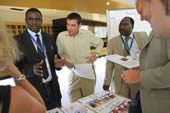 Km workshop: Staff from the PPILDA explaining a participatory process used to reach the poorest population groups in Aguié region
Km workshop: Staff from the PPILDA explaining a participatory process used to reach the poorest population groups in Aguié regionIn theNiger, a participatory process was used in the IFAD-supported Project for the Promotion of Local Initiative for Development in Aguié. This involved carefully identifying beneficiaries and benefits, adopting an inclusive targeting approach to reach the poorest population groups, and creating structures at the village level to take responsibility for the design and, most importantly, the monitoring and evaluation (M&E) of activities. This last aspect – involving village committees in charge of M&E, a system of evaluation based on village indicators, and the continuous sharing of knowledge about project results – has been particularly successful so far.
The following conclusions emerged from the discussions:
- Structures need to be set up to facilitate formal and non-formal institutional partnerships and dialogue within local-level institutions, the civil society and more broadly.
- Responsibilities need to be defined at all levels.
- Criteria for inclusive targeting need to be adopted to ensure that the poorest and most vulnerable community members (ethnic groups, young and elderly people, people with disabilities and women) can benefit from a project.
- Financial and fiscal rules need to be clearly spelled out to ensure sustainability, and innovative financing mechanisms devised to allow communities to take charge of their own economic development.
- Administrative constraints to the direct provision of resources to communities need to be removed, and this arrangement mainstreamed into normal government procedures.
For more information, contact:
Cristiana Sparacino
Country Portfolio Manager
- IFAD. 2009. “Community-driven development decision tools for rural development programmes”. 100p
- Community-Driven Development knowledge fair - Rome 2009
Stories from the field
IFAD-supported projects transform lives in Nigeria
 Woman sells cassava flour at roadside market
Woman sells cassava flour at roadside marketMargaret, a woman from the village of Woda, in Yala, Nigeria, is one of the many women who have benefited from the IFAD-financed Community-based Natural Resource Management Programme – Niger Delta in Nigeria. The programme worked to improve the living conditions, income and food security of poor smallholder households.
Before the programme, Margaret was desperate: she had been abandoned by her husband for a younger woman. Today, thanks to programme support, she owns a beauty shop; and, as a successful entrepreneur she has once again become beautiful to her husband – to the extent that he wants her back. When Margaret staunchly refused his advances, he decided he would put an end to her financial independence. Marching into IFAD offices, he demanded that she be dropped from the programme. For him, IFAD was to blame for all his troubles. Margaret laughed when she was told what happened. “IFAD has been sent to free me,” she said, only half in jest.
Margaret’s story is like those of many other women who, through participation in IFAD-funded programmes, have gained respect and financial independence.
“Our life has moved forward now thanks to the programme” says Mrs. C. M. Ajiboye Basiri, a member of the Women’s Cooperative Society, in Olayinka, Kwara State.
Another IFAD-financed operation in Nigeria, the Roots and Tubers Expansion Programme, has helped many households earn a decent living through cassava production and processing. Nigeria produces about 40 per cent of all root and tuber crops in Africa. It is the biggest producer of cassava and yams in sub-Saharan Africa, responsible for 35 per cent of all cassava produced in the region and 70 per cent of all yams.
The programme started by organizing villagers into groups so that they could pool their resources and improve their income opportunities. Selected group members then received training in specific skills. By working with groups and encouraging active farmer involvement in field activities, the programme was successful in promoting a farmer-to-farmer extension approach to knowledge and technologies. It also helped village groups purchase processing machines and equipment so they could start their own small businesses.
“Before the programme, we processed garri (tapioca) the traditional way using a locally made grater, sieve and a stone and wood press,” says Ajiboye C. M., president of the Basiri Women’s Cooperative Society in Olayinka, Kwara State. “The programme has brought modern equipment to our town, including cassava graters, sewing machines, tray fryers and a hydraulic press. It has helped increase our membership and attracted business to the town, while giving farmers a regular outlet for their produce.” She adds that the cooperative is planning to seek additional funding so that it can increase production and branch out into other cassava-based products such as cassava starch and odourless fufu powder (a kind of flour).
There are many, many stories about how people’s lives have been transformed by the programme. Some people have been able to send their children to school; others have put aside enough money to marry or take part in traditional rites that they could not afford before; still others were able to buy tools and equipment for their children when they completed an apprenticeship and were poised to start work on their own.
In 2008, about 1,500 households took part in the programme’s various activities. These included the cultivation of root crops such as cassava, sweet potatoes, Irish potatoes and yams; the production of planting materials; and the processing and marketing of cassava. Production outputs in the programme area were estimated at 1,383 tons of garri, 92 tons of cassava chips, 73 tons of starch and 25 tons of high-quality cassava flour. The programme’s success sparked a great deal of interest in the targeted villages. Some 143 new groups were formed and, as an important measure of their determination, agreed to contribute 10 per cent of the investment cost for implementing garri processing centres, as required.
Best practice for local development in Nigeria
Community-driven development (CDD) is an approach that puts communities in control of the development process. In particular, it gives them control over planning decisions and investment resources. CDD brings together, in a practical way, participatory approaches, community empowerment, responsive government and local capacity-building. Experience has shown that, given appropriate support, rural poor men and women can effectively work together and with local government to organize themselves and address local problems.
- The CDD approach is being scaled up and replicated with very satisfactory results in Nigeria, despite recurrent insecurity in the Niger Delta. Because of persistent conflicts and food price volatility, some state and local governments are “torn” between trying to exert pressure on communities to give priority to smallholder agriculture support services, which they feel are urgently needed, and allowing communities to decide for themselves, knowing that their projects usually favour rural and social infrastructure.
- Evidence shows that there have been positive changes in the livelihoods of both direct and indirect project and programme beneficiaries – in terms of enhanced food sufficiency; modest increases in family incomes; better access to health, education and transport services; and higher self-confidence, self-esteem and self-reliance among women and communities. Nearly 48,000 households benefited from improved extension services, and up to 800 small farmers received livestock and farm machinery under two now-closed IFAD-funded projects: the Sokoto State Agricultural and Community Development Project and Katsina State Agricultural and Community Development Project. Another closed operation, the Roots and Tubers Expansion Programme, provided over 18,750 households with improved planting materials and trained about 285,000 producers on new production technologies. Coverage and impact is even greater under the ongoing Community-based Natural Resource Management Programme - Niger Delta. The programme has 69 participating local governments. It has helped about 300,000 households improve agricultural productivity; provided training to nearly 41,000 people on demand-led community-driven development; and supported the formation and training of 14,880 community groups.
For further information, please contact:
Abdoul Barry
Country Programme Manager
Useful links:
Ghana: Successful experiences in fostering local development
 REP II has facilitated the access of young rural entrepreneurs to an integrated package of relevant support services
REP II has facilitated the access of young rural entrepreneurs to an integrated package of relevant support services To enable micro and small entrepreneurs to start up and expand their businesses, the Rural Enterprises Project, Phase II, has facilitated their access to an integrated package of relevant support services. These include business development services, provided through district-based business advisory centres; skills development (for instance, in basic engineering and metalworking), provided through rural technology facilities; and financial services, provided through rural and community banks. All institutions established or supported by the project are strongly anchored in the local community and district. While business advisory centres are part of the local government system, the rural community banks and trade associations are private-sector institutions.
The project has reached approximately 170,000 rural entrepreneur households and covered 66 districts in Ghana (see chart below)
The project is part of the Government of Ghana’s rural development and rural poverty reduction programme. It is cofinanced by IFAD, the African Development Bank and the Government. Its overall goal is to reduce poverty and improve living conditions in rural areas, with a particular emphasis on increasing the incomes of women and vulnerable groups by facilitating both self-employment and wage employment. Its immediate objective is to promote a competitive non-farm rural micro and small enterprise (MSE) sector in participating districts, supported by relevant, good- quality, easily accessible and sustainable services.
The project focuses on non-farm MSEs in order to provide a valid alternative to farming as an economic activity in the project area. Through the project, poor rural households have increased their employment and incomes. Project services are demand-driven, based on the expressed needs of the target group and community.
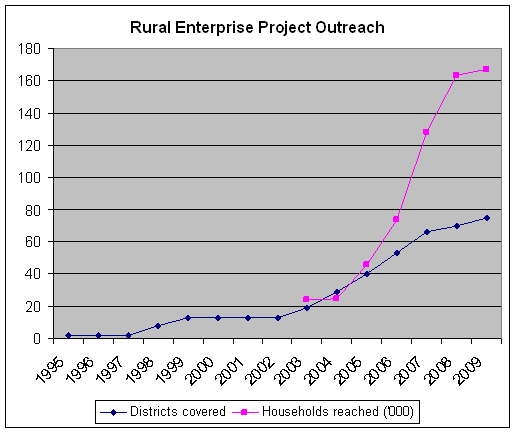
For further information, please contact:
Kwasi Attah-Antwi
Coordinator
Rural Enterprises Project, Phase II
Useful links:
News and events
IFAD to boost rural development in Benin
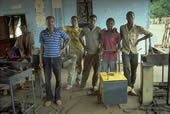 Artisans Cooperative from Toucountouna work on production of agricultural input material
Artisans Cooperative from Toucountouna work on production of agricultural input materialIFAD has provided US$17.92 million in financing for the Rural Economic Growth Support Project in Benin. Half of the funds are provided as a loan and half as a grant. The financing agreement for the project was signed in Rome on 21 July 2009 by Gregoire Akofodji, Benin’s Minister of Agriculture, Animal Husbandry and Fisheries, and Kanayo F. Nwanze, President of IFAD. The project will support local initiatives aimed at improving rural people’s income and living conditions. Its primary focus is on the development of agricultural value chains (for roots and tubers, rice, vegetables and pineapples) and on rural infrastructure. Some 70,000 people are expected to benefit from the project, which will make special efforts to reach the most vulnerable groups of women, men and young people in the targeted villages. Assistance will be channelled through inter-professional unions, set up to forge strong value chains and rural MSEs.
For further information, please contact:
Luyaku, Loko Nsimpasi
Country Programme Manager
Read more:
Strengthening local institutions through the Gender Equality Fund
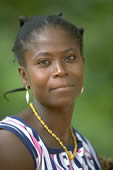 Portrait of Ahou N'Guessan, a member of the agouti farming co-operative in Attoungbrekro, 112 km east of Bouaké. Agouti farming has been introduced by the project to supplement diet and income.
Portrait of Ahou N'Guessan, a member of the agouti farming co-operative in Attoungbrekro, 112 km east of Bouaké. Agouti farming has been introduced by the project to supplement diet and income.Developing countries and donors have set up the Gender Equality Fund to accelerate progress towards the goal of gender equality and the economic and political empowerment of women. Spain contributed 50 million euros to launch this multi-donor initiative, which is administered by the United Nations Development Fund for Women.
The fund will build on the principles, practices and lessons learned of other thematic funds. These include: the Education for All–Fast Track Initiative; the Global Fund to Fight AIDS, Tuberculosis and Malaria; the MDG Achievement Fund, established by Spain and the United Nations Development Programme to speed up the achievement of the Millennium Development Goals; the MDG3 Fund: Investing in Equality, sponsored by the Netherlands, and supporting improved rights and opportunities for women and girls in developing nations; and the United Nations Trust Fund to End Violence against Women. The operational focus of the new Gender Equality Fund will be on supporting and strengthening national institutions (government, women’s parliamentary caucuses, women NGOs) in line with national priorities and ongoing work on gender equality and women’s empowerment.
Although IFAD cannot receive funds from the Gender Equality Fund, IFAD's constituency, especially rural women's organizations, will be eligible for direct funding from this fund. Moreover, IFAD will look for ways to provide additional funding in support of the fund’s efforts to strengthen women’s groups and institutions at the local level.
For further information, please visit:
IFAD delegation meets with the Prime Minister of Cote d'Ivoire
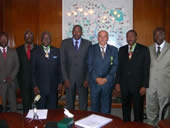 The IFAD delegation with the Minister of Agriculture, Amadou Gon Coulibaly
The IFAD delegation with the Minister of Agriculture, Amadou Gon CoulibalyIFAD President Kanayo F. Nwanze, together with the Director of the Western and Central Africa Division, Mohamed Béavogui, and the Country Programme Manager, Mohamed Tounessi, held talks with the Prime Minister of Cote d’Ivoire, Guillaume Soro last August in Abidjan. The talks centred on the importance of addressing the needs of smallholder farmers and rural poor people as part of an overall strategy to achieve national food sufficiency. The need to consolidate bilateral cooperation was also discussed. The delegation also met with the Minister of Agriculture, Amadou Gon Coulibaly; the Minister of Livestock Production and Fishery Resources, Alphonse Douati; and other senior government officials and members of the donor community present in Cote d’Ivoire. Nwanze and Béavogui were decorated with the Ivorian medal of “Commandeur dans l’Ordre du Mérite Agricole”, while Tounessi was given the medal “Officier dans l’Ordre du Mérite Agricole” in recognition of the work IFAD has been doing in the field of agriculture.
IFAD President meets Umaru Yar’Adua
Soon after the Group of Eight (G8) Summit in L’Aquila, Italy, the President of IFAD travelled to Nigeria for talks with President Umaru Musa Yar’Adua on 23 July 2009. Discussions were on a number of issues of common concern, including strategies for long-term investment in smallholder agriculture. Kanayo Nwanze also held talks with the Nigerian Minister of Agriculture and Water Resources, Sayyadi Abba Ruma; the Minister of Finance, Mansur Muhtar; and the Minister of Foreign Affairs, Ojo Maduekwe. In addition, he met with farmers’ organizations, United Nations officials and IFAD project managers.
IFAD delegation participates in AU-ECA meeting
IFAD President Nwanze and Mohamed Béavogui, Director of IFAD’s Western and Central Africa Division, took part in the Joint Annual Meeting of Ministers of Finance and Economy from the African Union (AU) and the United Nations Economic Commission for Africa (ECA) on 6-7 June 2009, in Cairo, Egypt. The theme of the meeting was “Enhancing the effectiveness of fiscal policy for domestic resource mobilization.”
AU endorses pan-African land policy
The African Union, at its Thirteenth Ordinary Session in Sirte, Libya, in early July, endorsed the Framework and Guidelines on Land Policy in Africa. The final document, the Declaration on Land Issues and Challenges in Africa, commits African Governments to prioritize, initiate and lead land policy development and implementation; to support the development of an associated institutional framework; and to allocate adequate budgetary support for these purposes. It is expected that this pan-African land policy will contribute to raising the profile of land tenure security as an essential element of poverty reduction efforts in Africa. The policy was developed under the leadership of the African Union Commission, the United Nations Economic Commission for Africa and the African Development Bank, with the support of IFAD, the Food and Agriculture Organization of the United Nations, the World Bank, the United Nations Human Settlements Programme and various civil society organizations.
FIDAfrique holds pioneer steering committee meeting
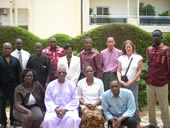 Members of FIDAfrique steering committee
Members of FIDAfrique steering committee The first FIDAfrique steering committee meeting took place on 15 and 16 June in Dakar, Senegal, at the headquarters of the West Africa Rural Foundation, which coordinates the network. The committee’s main responsibilities are to define the network’s strategic guidelines, pilot sustainability and institutional processes, approve the budget, monitor network performance and contribute to resource mobilization. The committee comprises two representatives each of Western and Central and Eastern and Southern Africa, a representative of farmers’ organizations, representatives of subregional coordination, and government officials. Members approved the 2009/2010 plan of action based on proposals made by projects and the supporting budget.
For further information, please contact:
Abdou Fall
Programme Coordinator
- 1-4 December: IFAD Regional Project Implementation Workshop for Western and Central Africa
In-country supervision missions
- 7-18 December: Rural Development Support Programme (PADER) and Participatory Artisanal Fisheries Development Support Programme (PADPPA), Benin
- 18-18 December: Participatory Smallholder Agriculture and Artisanal Fisheries Development Programme (PAPAFPA), Sao Tome and Principe
Publications, networking and information services
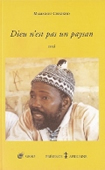 IFAD. 2009. “Community-driven development decision tools for rural development programmes”. 100p
IFAD. 2009. “Community-driven development decision tools for rural development programmes”. 100p- IFAD. 2009. “Guidance notes for institutional analysis in rural development programmes”
- “Dieu n’est pas un paysan” by Mamadou Cissokho, co-founder of the Pan-African Farmers’ Platform. The book is called “Dieu n'est pas un paysan” – “God is not a farmer”. It tells the story of Cissokho’s life and battles since the early 1970s when he decided to become a farmer in his home country, Senegal. Since then he has pioneered the West African farmers’ movement and is one of the founding leaders of the Pan-African Farmers’ Platform.